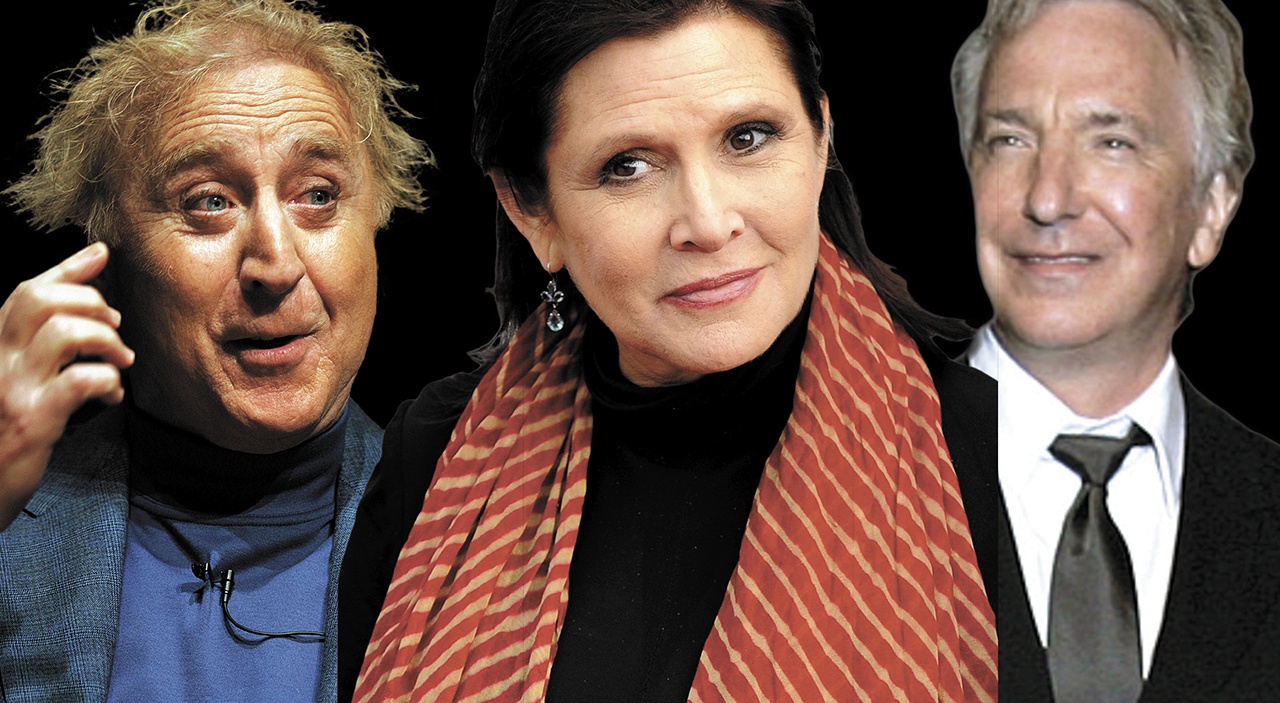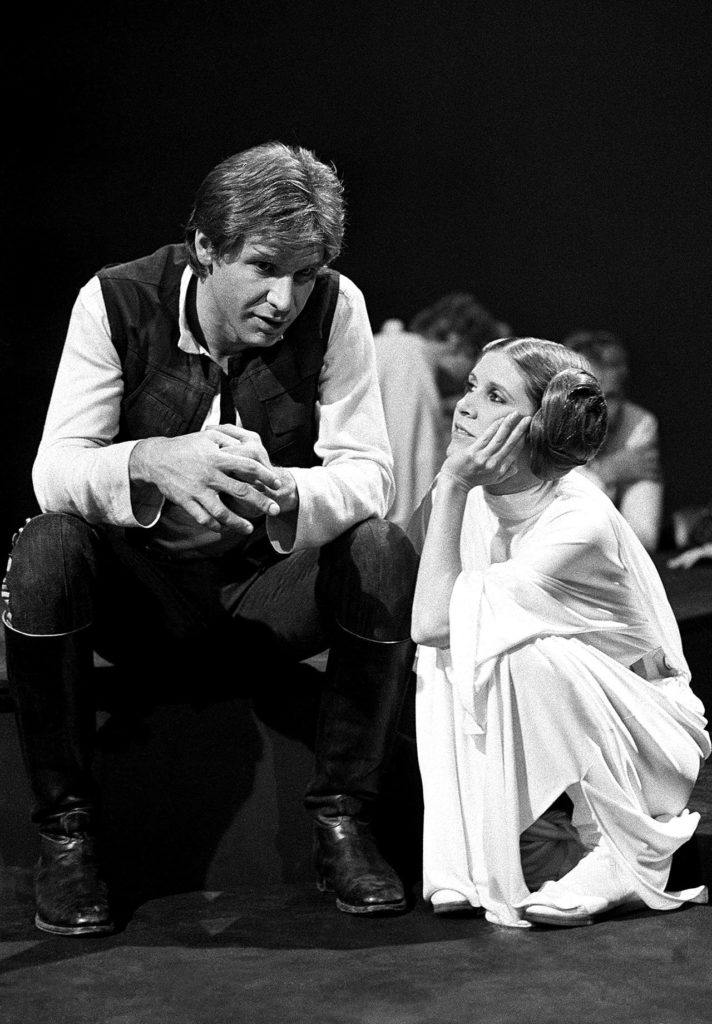Almost from the beginning of 2016, people have been talking about the high death toll amongst culture heroes. It was a rough year for beloved figures.
David Bowie and Prince in the same year — and out of nowhere, too. What about the cruelty of losing a young actor like Anton Yelchin in a senseless accident? Garry Shandling and Patty Duke — and it just went on.
Even the ageless Zsa Zsa Gabor (she was 99, actually) didn’t make it through the year.
Here’s an appreciation of a few onscreen personalities who left us in 2016. This list isn’t exhaustive, nor does it include all the biggest names. But these are movie people, great and obscure, who shined a light for a time.
Carrie Fisher: She starred in a science-fiction saga that proved popular over time. But even that phenomenon couldn’t overshadow the many talents of Debbie Reynolds’ daughter, who died earlier this week at age 60. (Sadly, Debbie Reynolds died the day after her daughter of a suspected stroke. She was 84.) Fisher’s caustic turn in “When Harry Met Sally” and her youthful flirtatiousness in “Shampoo” (forget “Star Wars,” this cameo made a big impression on my 16-year-old self) proved her acting chops, and then of course she turned into a witty writer; one of her novels, “Postcards from the Edge,” became a terrific film that fictionalized her own struggles to stay sane.
Gene Wilder: From his movie debut year in 1967 — briefly glorious in “Bonnie and Clyde,” then in full blooming flower in “The Producers” — Wilder was a unique and often literally hysterical presence. After his indelible roles as Willy Wonka and Young Frankenstein he went the writer-director route, and his own movies were rarely very strong. But he was always a pleasure, never more so than in “Everything You Always Wanted to Know About Sex,” contemplating the consequences of love with a sheep.
Alan Rickman: Movies like “Sense and Sensibility” and “Die Hard” proved Rickman’s range — and he was even able to get a lot into his ongoing “Harry Potter” role. When he visited the area for the 1991 film “Truly Madly Deeply,” he proved one of the warmest, smartest, funniest interview subjects I’ve ever met.
Ronit Elkabetz: This Israeli actress was a powerful presence in films such as “Late Marriage” and “The Band’s Visit.” Her final feature, “Gett,” was an example of an actor dominating a movie with a minimum of dialogue — and she wrote the screenplay, too. She was just 51 when she died.
Billy Chapin: He doesn’t have a showbiz credit after 1959, but as a child actor he played a central role in one of the great American films, “The Night of the Hunter.” Chapin is the kid who knows where a stash of money is hidden. The trick is keeping the knowledge from evil preacher Robert Mitchum.
George Kennedy: The man churned out so many bad films — the “Airport” sequels are quite a run — you could almost forget he won an Oscar — best supporting actor in 1967 for “Cool Hand Luke.” The beefy actor was always welcome, and he was a good sport to spoof his own image in the “Naked Gun” franchise.
Robert Vaughn: The last of the main cast of “The Magnificent Seven” to die, and a childhood hero as the star of “The Man from U.N.C.L.E.” The black-haired Vaughn wisely chose to exercise villainy at various points throughout his career, which kept him employed from “Bullitt” to “S.O.B.” to “Superman III.”
Jack Riley: A classic sitcom character actor: He was the gloomy Mr. Carlin in “The Bob Newhart Show.” Once in a while he’d turn up in a movie, from “The Long Goodbye” to “Boogie Nights,” and you’d wonder, “Hey, how did Mr. Carlin get here?”
Marni Nixon: The woman who famously dubbed the singing voices of Audrey Hepburn in “My Fair Lady” and Natalie Wood in “West Side Story” and a few other surreptitious bits of movie sleight-of-hand. They finally let her sing on screen as one of the mischievous nuns in “The Sound of Music.” That’s a career not quite like any other.
William Schallert: The Internet Movie Database credits him with over 350 acting gigs, and you could believe it was a zillion. Tall and dull-looking, Schallert played countless lawyers and doctors and teachers in movies and TV episodes, got a regular gig for a while as Patty Duke’s father in her ’60s sitcom, and then just never stopped working. When you’re watching old TV shows on retro channels, he’ll turn up sooner than later — the most reassuring presence on television.
Burt Kwouk: This English-born actor of Chinese heritage had many credits in film and TV, including a few classy pictures like “Empire of the Sun” and “Plenty.” But come on: He was Cato, opposite Peter Sellers, in the “Pink Panther” movies. That alone is Hall of Fame stuff.
Adrienne Corri: A British actress who made a lyrical impression in Jean Renoir’s “The River” in 1951, did a fine turn in “Dr. Zhivago,” and endured an unpleasant sequence in “A Clockwork Orange.” She did Shakespeare and she did Hammer Horror movies, and that’s a heckuva range for any actor.
Richard Libertini: A tall, goofy comedian with a gift for accents, Libertini got on an especially good run after “The In-Laws,” and brightened many an ‘80s comedy: “Best Friends,” “All of Me,” and “Fletch” among them. Who knows what his real accent was?
Robert Horton: No, this is not written from the grave. The lanky 91-year-old co-star of “Wagon Train” was someone I always paid attention to (occasionally I got emails from fans of his, and I directed them to his website). He did a Broadway musical, he did the Japanese horror film “The Green Slime,” but his career was in a fairly low key for a long time. Still, you only get so many namesakes, so here’s to wagon train scout Flint McCullough, out there on the last trail.
Talk to us
> Give us your news tips.
> Send us a letter to the editor.
> More Herald contact information.


























